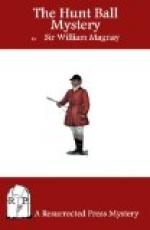Late on the next Sunday afternoon Gifford had gone for a country walk which he had arranged to bring him round in time for the evening service at the little village church of Wynford standing just outside the park boundary. His way took him by well-remembered field-paths which, although towards the end of his walk darkness had set in, he had no difficulty in tracing. The last field he crossed brought him to a by-road joining the highway which ran through Wynford, the junction being about a quarter of a mile from the church. As he neared the stile which admitted to the road he saw, on the other side of the hedge and showing just above it, the head of a man. At the sound of his footsteps the man quickly turned, and, as for a moment the fitful moonlight caught his face, Gifford was sure he recognized Gervase Henshaw. But he took no notice and kept on his way to the stile, which he crossed and gained the road. As he did so he glanced back. A horse and trap was waiting there with Henshaw in it. He was now bending down, probably with the object of concealing his identity, and had moved on a few paces farther down the road.
Why was he waiting there? Gifford asked himself the obvious question with a decidedly uneasy feeling. Henshaw the Londoner, on a Sunday evening, waiting with a horse and trap in an unfrequented lane, a road which ran nowhere but to a farm. What did it mean?
Naturally Gifford’s suspicions connected Edith Morriston with the circumstance, and yet he told himself the idea was monstrously improbable. It was more likely that Henshaw was bound upon some search with the police. His movements were and had been for some time mysterious enough.
Gifford’s impulse as he turned into the high road was to stay there in concealment and watch for the upshot of Henshaw’s presence. The suggestion did not, however, altogether commend itself to him. He disliked the idea of spying even upon such a man as Henshaw, whom he had good reason to suspect of playing a dastardly game. It was probable, too, that Henshaw had recognized him and might be on the look-out; it would be intensely humiliating to be caught watching. So, turning the pros and cons over in his mind, Gifford walked slowly on in a state of irresolution till he came to a wicket-gate which admitted from the road to a path which ran through the churchyard.
There he stopped, debating with himself whether he should turn back and keep an eye on Henshaw or go on into the church where service was just beginning. It did seem absurd to imagine that Henshaw with his conveyance could be waiting there by appointment for a girl of the character and position of Edith Morriston. True, he had seen them walking together in secret, which was strange enough, but that need not necessarily have been a planned meeting.
Such an urgent curiosity had hold of him at the bare possibility of something wrong that he, temporizing with his scruples, was about to turn back to the lane, when he saw the figure of a woman coming towards him along the churchyard path. She was tall and so far as he could make out, muffled in a cloak and veil. His heart gave a leap, for although the woman’s face and figure were indistinguishable the height and gait corresponded with those of Edith Morriston.




